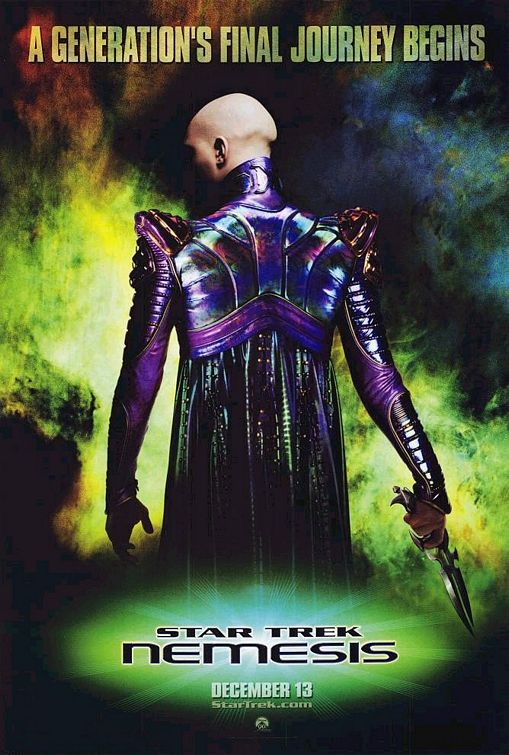
| None | Light | Moderate | Heavy | |
|---|---|---|---|---|
| Language | ||||
| Violence | ||||
| Sex | ||||
| Nudity |
Content:
(H, Ev, BBB, CC, PC, Ho, Pa, L, VV, S, A, MM) Light humanist worldview with evolution references and very strong, but flawed, moral elements, strong redemptive and very brief Christian content with a New Testament reference (Captain Picard refers to the love chapter in First Corinthians by saying during important scene, “We see through a glass darkly,” major plot point where people risk their lives to the point of sacrifice for other people, and characters display willingness to examine their own hearts and better themselves) as well as a couple of politically correct elements displaying moral and cultural relativism elements (android refers to “transgender species” and comical references to alien wedding ceremonies where it’s required that everyone be nude during ceremony), subtle homosexual allusions, and some New Age elements regarding the evolution of telepathy in alien species, including one of the officers among the good guys; about four or five light obscenities; strong, sometimes scary science fiction action violence including hand-to-hand combat, space battles, explosions, laser fire, and impaling; newlyweds start to make love in bed when they are interrupted by a nightmarish vision of the enemy, who’s trying to control and “rape” the woman’s thoughts and emotions; no nudity; alcohol use and Klingon complains about his terrible headache from drinking too much Romulan ale; and, alien woman murders entire elected Senate in her government in successful coup attempt but later repents and decides to join the good guys, but with little apparent future consequences, such as restitution or punishment, for that earlier horribly evil act.
GENRE: Science Fiction
H
Ev
BBB
CC
PC
Ho
Pa
L
VV
S
A
MM
More Detail:
On another planet, however, things are not so festive. The Romulan Imperial Senate is in session. The praetor, or leader of the Senate, is hearing forceful arguments from the military leaders to join up with the Remans on their sister planet and become strong enough to beat even the Federation. When the praetor strongly refuses the proposal, one senator excuses herself, leaving a mouse-looking device at her place. Strange smoke soon wafts from this device throughout the room, and the Romulan political leaders begin turning into cement-looking statues, falling over dead.
Meanwhile, in the first action sequence, the crew of the Federation starship Enterprise discovers discarded parts of an early android version of Lieutenant Commander Data. After putting this mirror image of Data, named B4, back together, an official of the Federation quickly requests that Captain Picard go immediately to Romulus. There, the new praetor, Shinzon, whom they soon find out is a young clone of Captain Picard, appears to want peace with the Federation. He tells them that the Romulans created him in a plot to replace Picard and attack the Federation from within. A change in government, however, led them to discard Shinzon as a slave on Remus. On Remus, they mistreated both Shinzon and the Remans. With help from a Reman overseer, Shinzon decided to lead the military coup against the Romulan government.
The crew of the Enterprise begins to suspect foul play, however, when they find that someone has broken into their computer system. Soon, Captain Picard is captured by Shinzon. The Captain finds that Shinzon needs the Captain to supply him with his matching genetic material in order to survive. Even worse, Shinzon’s invisible warbird spaceship has been programmed with the ability to destroy all the people on other spaceships and even entire planets! His plan is to kill off the Federation’s military people before destroying all the people on Earth. The whole crew of the Enterprise faces almost insurmountable odds, with many physical and emotional challenges in store.
NEMESIS is action-packed, science fiction fun for STAR TREK fans and others. It’s one of the best STAR TREK movies in years. In fact, many may consider it even better than STAR TREK VIII: FIRST CONTACT, which is generally considered one of the three best STAR TREK movies, along with STAR TREK II: THE WRATH OF KHAN and STAR TREK IV: THE VOYAGE HOME.
The old beloved stars of THE NEXT GENERATION do a terrific job and are ageing quite nicely. Special kudos should go to both Patrick Stewart as Pickard and especially Brent Spiner as Data and B4. Both of Spiner’s characters play an important role in the movie’s extremely poignant, redemptive ending. The story is extremely well-written, especially in the second and third acts. The filming in the B4 pickup sequence on an arid planet was a bit strange – grainy and overexposed, in an attempt to represent an alien atmosphere. That photography adds nothing and detracts from the action scenes during that sequence.
As with many of the other STAR TREKS, NEMESIS portrays a strong, moral captain who makes selfless and wise decisions and has at the forefront the goal of unifying the galaxy in peace. Though his godly virtues are portrayed, they are only rarely verbalized, with the exception of a quotation from I Corinthians 13 of the Christian New Testament about “seeing through a glass darkly.”
The bad guys in NEMESIS will be scary-looking to younger children and some or many older children. The violence for the cognitively immature could be traumatic. There is also a veiled portrayal of the beginnings of a bedroom sex scene between newlyweds. Interrupting their wedded bliss are Shinzon and his demonic-looking Reman friend, who use the Reman’s telepathy ability to attempt to exercise mind rape over the newly married alien telepath Deanna Troi.
Some viewers will find spiritual parallels to Christianity in several of the themes in NEMESIS. Not only does Captain Picard portray moral leadership, but the evil enemy stops at nothing to find insidious, merciless ways to attack innocent people and murder them. The moral premise of STAR TREK: NEMESIS also contains strong redemptive aspects of sacrifice and struggling with demonic evil. The Captain’s clone might represent the carnal nature in us all, which is continually trying to vie for enthronement. Although there are also some very subtle homosexual, narcissistic nuances to Picard’s relationship with his clone, the movie seems to represent these nuances as evil.
Despite the strong moral and redemptive content, the world of STAR TREK, including this movie, has a humanist worldview. There are even a few references to evolution in STAR TREK: NEMESIS.
NEMESIS also contains a couple politically correct elements. During the human wedding reception between Riker and his beloved alien wife, Deanna, Data gives a speech where he states something like, “Ladies, gentlemen and transgender alien species.” This is a politically correct, but purportedly humorous reference to today’s identity, sexual politics of the secular humanist left. Later in the story, there are also jokes about the crew having to attend a second wedding ceremony on Deanna’s home planet, a ceremony where everyone is supposed to go naked. Lieutenant Commander Worf, the Klingon, complains to Captain Picard, saying that he refuses to be naked. Picard, however, reminds Worf of the Federation’s politically correct policy of cultural relativism. In other words, in the STAR TREK universe, everyone must respect, and even obey, the immoral practices of other beings, even if they find them morally or personally objectionable or humiliating. To the media wise, intelligent, biblically sound Christian, these politically correct elements point up the ridiculous, absurd, inane nature of the humanist, anti-Christian left. Their politically correct policies of sexual politics and moral relativism are inherently irrational.
In contrast to this moral relativism, however, STAR TREK: NEMESIS ultimately takes the position that everyone is still required to do the righteous thing. For example, Picard wonders that, if he was faced with the same abuse from the Romulans as Shinzon, whether he would be led to do some of the same immoral acts. The movie’s answer is no, because, unlike his clone, Picard has a moral conscience that usually forces him to rise above his circumstances and do the right things. Thus, NEMESIS ultimately, but unconsciously, perhaps, reflects Paul’s argument in the Book of Romans in the New Testament, where Paul says that people who aren’t fully aware of God may still follow God’s Law in their hearts and even their actions.
Mostly, however, STAR TREK: NEMESIS is meant to be an entertaining treatment of the moral fight against evil, not only the evil outside, but also the internal evil seducing seduce us in our hearts. Sacrifice plays an important role in that fight, the movie suggests.
Even so, parents should leave their smaller children at home. They should also consider leaving their older children at home as well. Finally, non-fans might want to bring a friend along, for some help with “who’s who” and “what’s what!”
Please address your comments to:
Sherry Lansing, Chairman
Motion Picture Group
Paramount Pictures
A Paramount Communications Company
5555 Melrose Avenue
Los Angeles, CA 90038-3197
Phone: (323) 956-5000
Website: www.paramount.com


 - Content:
- Content: 






